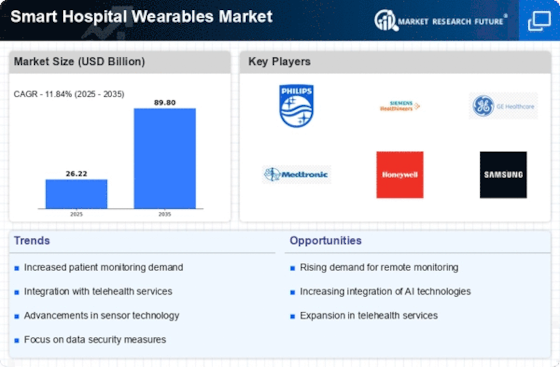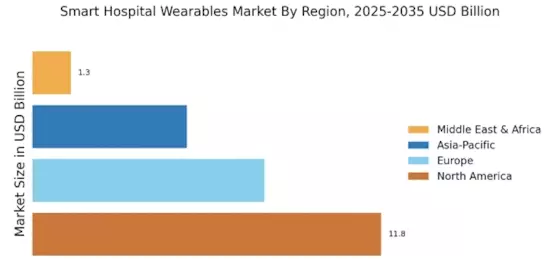Growing Focus on Preventive Healthcare
The Smart Hospital Wearables Market is increasingly aligned with the growing focus on preventive healthcare. As healthcare systems shift from reactive to proactive approaches, wearables play a crucial role in early detection and prevention of health issues. These devices empower patients to take charge of their health by providing insights into their physiological conditions. The market is projected to expand as more healthcare providers recognize the value of integrating wearables into their preventive care strategies. It is estimated that the preventive healthcare segment will contribute significantly to the market's growth, potentially reaching a valuation of USD 10 billion by 2027.
Regulatory Support and Standardization
The Smart Hospital Wearables Market is also influenced by regulatory support and the push for standardization in wearable technologies. Governments and regulatory bodies are increasingly recognizing the importance of establishing guidelines that ensure the safety and efficacy of wearable devices. This regulatory framework not only fosters consumer trust but also encourages manufacturers to innovate within defined parameters. As a result, the market is likely to see a rise in compliant products that meet stringent quality standards. The establishment of such regulations is expected to enhance market growth, as it provides a clear pathway for new entrants and existing players to navigate the complex landscape of healthcare technology.
Rising Demand for Remote Patient Monitoring
The Smart Hospital Wearables Market is witnessing a notable increase in demand for remote patient monitoring solutions. This trend is largely fueled by the need for continuous health tracking, especially for chronic disease management. Wearable devices equipped with advanced monitoring capabilities allow healthcare providers to track patients' health metrics from a distance, thereby facilitating timely interventions. According to recent estimates, the remote patient monitoring segment is expected to account for over 40% of the overall market share by 2026. This shift towards remote monitoring not only enhances patient outcomes but also optimizes resource allocation within healthcare facilities.
Increased Investment in Healthcare Technology
The Smart Hospital Wearables Market is benefiting from increased investment in healthcare technology. Governments and private entities are channeling funds into the development of innovative wearable solutions that enhance patient care and operational efficiency. This influx of capital is likely to accelerate research and development efforts, leading to the introduction of more sophisticated devices. Recent reports indicate that investment in healthcare technology is expected to exceed USD 500 billion by 2025, with a substantial portion directed towards wearable technologies. This trend suggests a robust future for the Smart Hospital Wearables Market as stakeholders seek to leverage technology for improved health outcomes.
Technological Advancements in Wearable Devices
The Smart Hospital Wearables Market is experiencing a surge in technological advancements, particularly in sensor technology and data analytics. These innovations enable wearables to monitor vital signs with unprecedented accuracy and real-time data transmission. For instance, the integration of advanced sensors allows for continuous monitoring of heart rate, oxygen levels, and other critical parameters. This capability not only enhances patient care but also reduces the burden on healthcare professionals. As a result, the market is projected to grow at a compound annual growth rate of approximately 25% over the next five years, driven by the increasing demand for efficient healthcare solutions.

















